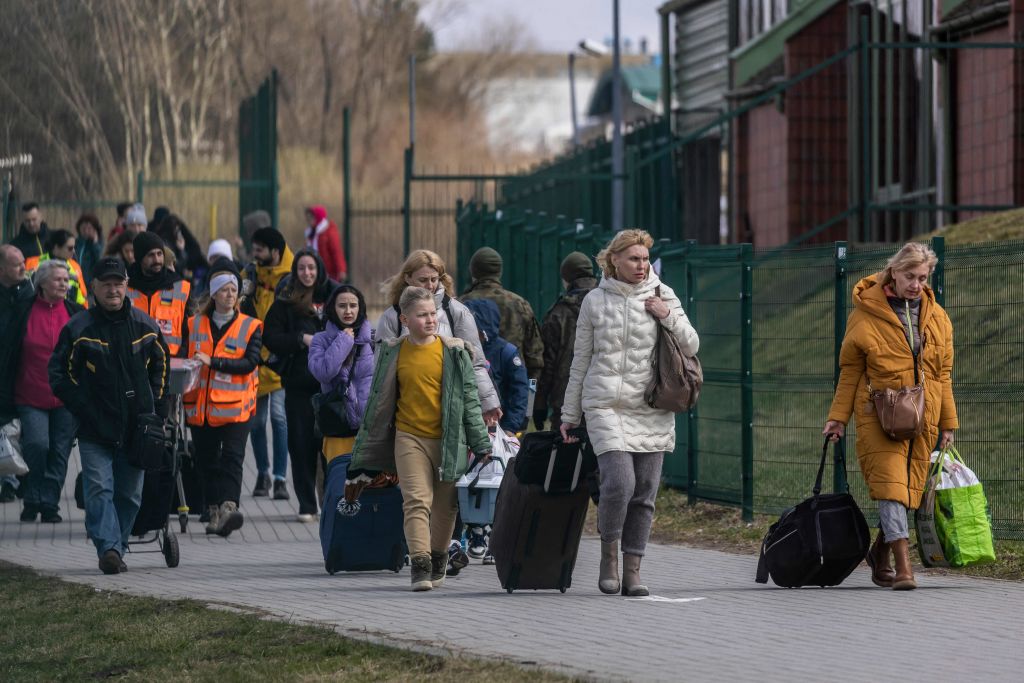Hundreds of thousands of Ukrainian refugees have already streamed into Slovakia, Hungary and the Czech Republic. Head north to Poland, and the numbers go from the unprecedented to the jaw-dropping: two and a half million refugees have entered the country with a total population of 38 million since the war in Ukraine began.
In the Czech Republic, where I live, official estimates put the current number of refugees at over 300,000, a figure expected to rise to between 500,000 and 600,000 in the coming months. In a country of less than eleven million, that’s five percent of the population. In Poland, a proportion closer to ten percent is possible.
At the moment, most of the Czech Republic’s refugees are concentrated in Prague. Many in the capital already know refugees, and some — including guilt-stricken Russians — have opened their homes to them. Yet amid an outpouring of goodwill, public infrastructure is buckling under the strain.
The most immediate concern is whether the healthcare system will be able to care for refugees while still carrying out procedures for Czechs. Government officials are desperately searching for ways to allow Ukrainians with medical experience to take up their profession so they can start caring for their own community.
Accommodation is woefully scarce. Real estate companies field dozens of enquiries from Ukrainians for every property on the market, and warn that if all refugee families seek accommodation, they will exhaust an entire year’s housing stock. The problem is even more acute in Poland, Slovakia and Romania — all three have huge volumes of refugees and Europe’s lowest ratios of housing space per capita.
Meanwhile, language schools are packed with Ukrainian school-age children — making up around half of all refugees — for whom learning Czech is a matter of urgency so that they can continue their education. Once these kids are ready for school, thousands more teachers and support staff will need to be found for classes which will increase in size due to a law passed in mid-March. Given that the Czech Republic has the lowest levels of unemployment in the EU, it’s hard to see where this new workforce will come from.
It’s therefore no surprise that refugees’ access to the labor market is being made as easy as possible, with temporary visas automatically granting them full working rights. Drawing on stereotypes of Ukrainians as cheap manual laborers, some have suggested this situation could ease chronic shortages in the Czech Republic’s vital automotive and manufacturing sectors. Yet around 80 percent of adult refugees are women, who are less likely to take on heavy industrial work.
The strain on jobs, accommodation, education and services has already seen Prague’s overwhelmed authorities calling for refugees to be spread out more evenly across the country. Yet alleviating pressures on the capital would open a Pandora’s Box elsewhere.
Czechs in more rural areas tend to be less welcoming towards refugees. Living in Prague, I was initially skeptical when I read data suggesting only a quarter of Czechs are happy with refugees receiving state benefits, or help finding accommodation and work. But head out to less-developed rural areas, and you find the subject of refugees met with a grimace not of sympathy, but of trepidation.
In Prague, the arrival of a huge new workforce is a major jolt to the system — but there will still be enough jobs to go around. In small towns and villages, though, a significant influx could fundamentally alter the nature of job markets, as well as the availability of accommodation and services. Opposition parties are already using fear of this eventuality as ammunition against the government, claiming it is “putting Ukrainians above Czech people,” and causing “harm and discrimination against Czech citizens.”
Such statements are opportunistic, but they correspond more with what people in poorer regions actually think than big-city dwellers like to believe. A rural challenge to western narratives about the war in Ukraine and the refugee crisis can be found in Slovakia, too — while in Hungary, Viktor Orbán’s landslide election victory was based on a policy of non-intervention in Ukraine which found favor in rural heartlands.
Ironically, such isolationist tendencies are in part responsible for these countries’ current refugee predicament. Their blunt refusal to participate in the EU’s quota system for Syrian migrants back in 2015 now makes it impossible for them to ask for a similar redistributive scheme for Ukrainians. They’ve instead asked Brussels to help shoulder the financial burden of the crisis — a course which, in Czech eurosceptic circles, is taken as proof that the government is little more than a useful idiot for Western powers.
Even so, rumblings of unease mostly relate to fears of the future. There’s no way of knowing how many more Ukrainians will arrive — or when they will go back home. Polls suggest that even Czechs providing whole-hearted support to Ukrainians would not be happy if told they would be staying in the country for more than a few months. Meanwhile, fears of economic migration haven’t gone away, and blue-collar communities will be starting to wonder whether, instead of the mass exodus back to Ukraine currently being forecast, refugees will instead be joined by their menfolk when the circumstances permit.
With capacities already stretched to the limit, such unpleasant questions are becoming inevitable. Eastern Europe’s new humanitarian superpowers are realizing that the refugee crisis could lead to a long-term change in the fabric of their societies — a change for which they are not economically, politically or psychologically prepared.


















